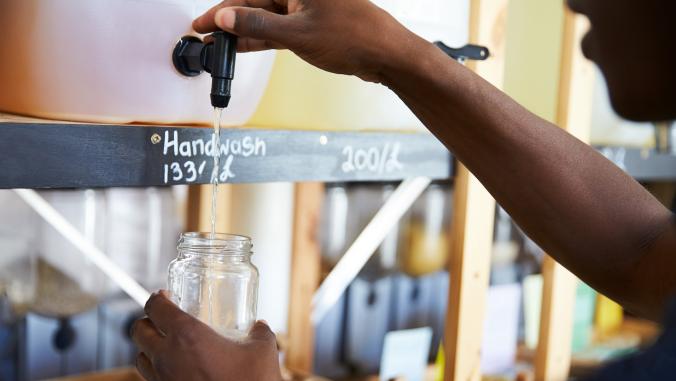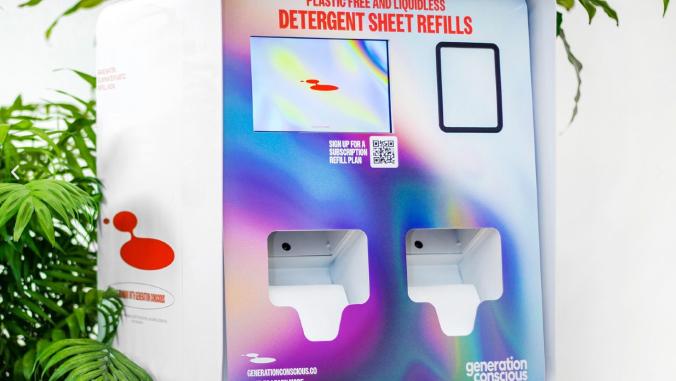As a circular economy professional, I’ve always found Amsterdam revitalizing. From the city-wide circular commitments to the city-funded circular accelerator, all the way down to the delightfully clear signage that decorates waste and recycling bins, the city is teeming with inspired circular solutions.
That's why I was curious to attend the Future of Plastics and Packaging conference, a gathering of more than 100 industry stakeholders across the plastics value chain, hosted by sustainability events company Innovation Forum. Could Amsterdam breathe fresh life into a conversation that often feels stuck in buzzwords, platitudes and far-off goals?
Unfortunately, gathering in a city where innovation seems to bloom at every corner did not deliver mind-blowing or earth-shifting revelations. From where I’m sitting, the dialogue around plastics remains frustratingly stagnant, even when big businesses, innovative startups and vocal policy players are convening together.
Yet the plastic waste crisis — and the climate crisis it’s inextricably linked to — remains a threat we must address. Here are some themes I heard often and loudly at the event, with calls to actions that might just unstick this conversation:
Everything everywhere all at once
To solve the plastics crisis we need an "everything and the kitchen sink" approach.
Regulation, collaboration, innovation, reduction, consumer education, supply chain optimization, material innovation, funding, infrastructure — even imperfect solutions such as chemical recycling and plastic credits. We need it all.
It’s nearly assured that many of these strategies will fall short of full success. While cross-industry collaboration is essential, it can slow down momentum. Thus accelerating drivers, like regulation, are necessary.
While innovation can break new ground as we test new materials and recycling technologies, it can’t solve all challenges, like the ever-confounding quagmire of plastic films. Thus strategies to reduce both plastic production and use are mission critical.
While reuse and refill business models can offer exceptional opportunity for financial and sustainability gains, these strategies haven’t been cracked at scale. Thus funding and logistics optimization are key.
Each strategy must complement another and, since the plastics and packaging industry inherently moves slowly, we have no time to waste.
The call to action: If you aren’t advancing all of the above, it’s time to revamp your strategy.
We’re in a transition
Thanks to policies both passed and pending, the world of packaging is in a transitionary period. Perhaps most notably, a global plastics treaty — set to be finalized in 2024 — looms large across the plastics ecosystem.
Many conference speakers noted that optional packaging commitments — such as those outlined in the Ellen MacArthur Foundation’s Global Commitment — may soon be compulsory. Put another way, the voluntary ceiling may soon be the regulatory floor.
The days of waiting cautiously for regulation to pass should be behind us. To stay ahead of the curve, businesses must look around corners and plan for the production reductions, extender producer responsibility and reuse quotas that increased global, national and regional regulation may soon inflict.
The call to action: Rather than wait for the regulatory stick, chase the carrots afforded to those at the head of the pack.
Without trust, we cannot move forward
Without trust we cannot share honestly, and without honesty, we can’t work together. (Remember, collaboration is an essential component of the kitchen sink strategy.)
One somber reflection I heard in Amsterdam was that every piece of the value chain is perceived to be fighting for its own agenda, rather than the collective. The result? A tight-lipped community that sticks to its talking points, even in the safe sandbox of Chatham House Rule, which the conference enforced.
This tendency toward reticence has to stop. When reuse pilots go quietly into the night, it’s essential to understand what went wrong, and why they remain without significant funding. When packaging commitments can’t or won’t be reached, it’s essential we hear honestly what has happened and why.
The call to action: It’s time to speak bluntly about what’s not working.
If we can’t share openly and honestly, stagnation will continue to be the name of the game. Let’s get this conversation moving.






